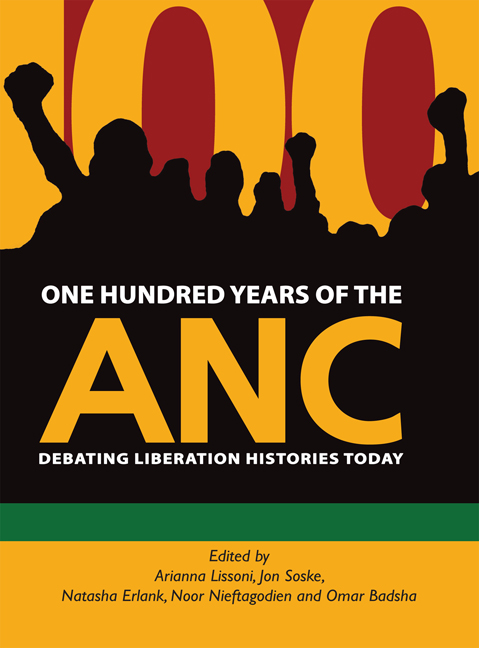Book contents
- Frontmatter
- Contents
- Acknowledgements
- Editorial Note
- FIRST KEYNOTE ADDRESS: Fragmentation and Cohesion in the ANC: The First 70 Years
- SECOND KEYNOTE ADDRESS: A Continuing Search for Identity: Carrying the Burden of History
- Chapter One One Hundred Years of the ANC: Debating Struggle History After Apartheid
- Chapter Two Religion And Resistance In Natal, 1900–1910
- Chapter Three Christianity and African Nationalism in South Africa in the First Half of the Twentieth Century
- Chapter Four Charlotte Maxeke: A Celebrated and Neglected Figure in History
- Chapter Five Imagining the Patriotic Worker: The Idea of ‘Decent Work’ in the ANC's Political Discourse
- Chapter Six Popular Movements, Contentious Spaces and the ANC, 1943–1956
- Chapter Seven Unravelling the 1947 ‘Doctors’ Pact’: Race, Metonymy and the Evasions of Nationalist History
- Chapter Eight The Politics of Language and Chief Albert Luthuli's funeral, 30 July 1967
- Chapter Nine Robben Island University Revisited
- Chapter Ten Shishita: A Crisis in the ANC in Exile in Zambia, 1980–811
- Chapter Eleven Comrade Mzwai
- Chapter Twelve Revisiting Sekhukhuneland: Trajectories of Former UDF Activists in Post-Apartheid South Africa
- Chapter Thirteen Regeneration of ANC Political Power, from the 1994 Electoral Victory to the 2012 Centenary
- Chapter Fourteen The ANC: Party Vanguard of the Black Middle Class?
- Chapter Fifteen Globalisation, Recolonisation and the Paradox of Liberation in Southern Africa
- Contributors
- Index
Chapter Four - Charlotte Maxeke: A Celebrated and Neglected Figure in History
Published online by Cambridge University Press: 21 April 2018
- Frontmatter
- Contents
- Acknowledgements
- Editorial Note
- FIRST KEYNOTE ADDRESS: Fragmentation and Cohesion in the ANC: The First 70 Years
- SECOND KEYNOTE ADDRESS: A Continuing Search for Identity: Carrying the Burden of History
- Chapter One One Hundred Years of the ANC: Debating Struggle History After Apartheid
- Chapter Two Religion And Resistance In Natal, 1900–1910
- Chapter Three Christianity and African Nationalism in South Africa in the First Half of the Twentieth Century
- Chapter Four Charlotte Maxeke: A Celebrated and Neglected Figure in History
- Chapter Five Imagining the Patriotic Worker: The Idea of ‘Decent Work’ in the ANC's Political Discourse
- Chapter Six Popular Movements, Contentious Spaces and the ANC, 1943–1956
- Chapter Seven Unravelling the 1947 ‘Doctors’ Pact’: Race, Metonymy and the Evasions of Nationalist History
- Chapter Eight The Politics of Language and Chief Albert Luthuli's funeral, 30 July 1967
- Chapter Nine Robben Island University Revisited
- Chapter Ten Shishita: A Crisis in the ANC in Exile in Zambia, 1980–811
- Chapter Eleven Comrade Mzwai
- Chapter Twelve Revisiting Sekhukhuneland: Trajectories of Former UDF Activists in Post-Apartheid South Africa
- Chapter Thirteen Regeneration of ANC Political Power, from the 1994 Electoral Victory to the 2012 Centenary
- Chapter Fourteen The ANC: Party Vanguard of the Black Middle Class?
- Chapter Fifteen Globalisation, Recolonisation and the Paradox of Liberation in Southern Africa
- Contributors
- Index
Summary
Charlotte Maxeke is one of the most misunderstood figures in South African nationalist narratives about the struggle for liberation. Maxeke is known as a ‘mother of the liberation struggle’ but no more – not an intellectual, a theorist, a feminist or a nationalist, merely a figurehead. Yet Maxeke's life enables an interrogation of the links that bind the state, women's political pasts and the politics of the public and private. Although she is celebrated within the African National Congress (ANC) and more broadly (witness the renaming of Johannesburg Hospital Charlotte Maxeke in 2008), the nationalist narratives of the struggle do not engage in a meaningful dialogue with Maxeke's ideas about, for instance, gender inequality, ‘native womanhood,’ justice, education, health and employment. Biographies of the nationalist movement sketch her as a subject whose identity has been misinterpreted. One example of this misunderstanding is the attempts to fix her within linear, incremental narratives about the origins of the liberation struggle.
While it highlights the strategies used by the nationalist movement, the literature on the rise of African nationalism in South Africa overlooks the intellectual history of women. This has resulted in what I call ‘struggle biography,’ which casts the involvement of women in the struggle in predetermined terms as an effect of the generosity of male figures. This chapter attempts to account for the intellectual history of women such as Maxeke, who injected a gendered reading of society into nationalist politics in the context of the 1910s and 1920s, thus shaping public political discourse in the early twentieth century. It does so by focusing on the socio-economic context that groomed Maxeke into a political subject in the various stages of her life: her family background, education, adulthood and political activities.
My research into Charlotte Maxeke's intellectual contribution began with an evaluation of collections and narratives of the struggle for liberation. My personal interest in the struggle was largely influenced by interviews I conducted with political activists while working as a research assistant for the South African Democracy Education Trust (SADET), although my new interest soon distracted me from my original task. Outside the confines of the SADET project, my interest in the participation of women took on a life of its own as I began to focus on primary documents.
- Type
- Chapter
- Information
- One Hundred Years of the ANCDebating Liberation Histories Today, pp. 97 - 110Publisher: Wits University PressPrint publication year: 2012



